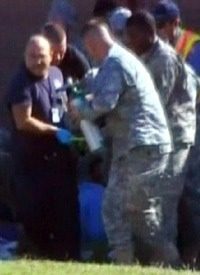
Major Nidal Malik Hasan, an Army psychiatrist, on November 5 went on a shooting rampage at Fort Hood in Texas. The ensuing gunfire left 13 dead and 30 injured. Hasan himself was shot four times by law enforcement personnel. He survived and is currently under military guard in a hospital.
Hasan is unconscious and on a ventilator. Lieutenant General Bob Cone at Fort Hood commented, “I would say his death is not imminent.” Hasan’s shooting spree is believed to be the worst in history at any U.S. military base.
Fox News reported on November 6 that there is a chance “some casualties may have been victims of ‘friendly fire,’ shot by authorities amid the mayhem and confusion at the scene,” according to a senior U.S. official who was speaking anonymously.
Hasan, a Virginia native and a Muslim, was about to be deployed overseas. Retired Colonel Terry Lee told Fox News that he had worked with Hasan, and Hasan was scheduled to go to Afghanistan. Lee said Hasan wanted to see U.S. troops pulled out of Afghanistan and Iraq, and he often engaged in arguments with other military personnel who supported the wars.
Federal law enforcement officials told AP that they had first taken notice of Hasan about six months ago, but they did not open an official investigation at the time. Hasan had made some Internet postings that mentioned suicide bombers and compared them favorably to a soldier who throws himself on a grenade to protect others.
“To say that this soldier committed suicide is inappropriate. It’s more appropriate to say he is a brave hero that sacrificed his life for a more noble cause,” Hasan allegedly claimed in the posting. “Scholars have [paralleled] this to suicide bombers whose intention, by sacrificing their lives, is to help save Muslims by killing enemy soldiers.”
Hasan had worked at Walter Reed Army Medical Center for six years before receiving a poor review. He was transferred in July from Walter Reed to Darnall Army Medical Center at Fort Hood.
The shooting happened at about 1:30 p.m. on November 5 at the Soldier Readiness Center, where soldiers are medically screened before deployment or when returning from deployment. Hasan reportedly had two weapons, and at least one was semi-automatic.
President Barack Obama said the incident was a “horrific outburst of violence” on the members of America’s armed forces. He noted, “It is horrifying that they should come under fire at an army base on American soil.”
Actually, it is just as horrifying when they come under fire while waging undeclared, unconstitutional wars in foreign lands. Americans have now been fighting in Iraq and Afghanistan longer than the amount of time the United States spent fighting World Wars I and II combined — and there is still no end in sight. The strain of perpetual war on our troops is terribly debilitating.
The Wall Street Journal on November 3 pointed out that 16 American soldiers killed themselves in October — both in the United States and overseas — “an unusually high monthly toll that is fueling concerns about the mental health of the nation’s military personnel after more than eight years of continuous warfare.”
“The October suicide figures mean that at least 134 active-duty soldiers have taken their own lives so far this year, putting the Army on pace to break last year’s record of 140 active-duty suicides,” the Journal reported. “The number of Army suicides has risen 37% since 2006, and last year, the suicide rate surpassed that of the U.S. population for the first time.”
According to the Journal, “The Army’s top generals worry that surging tens of thousands more troops into Afghanistan could increase the strain felt by many military personnel after years of repeated deployments to Iraq and Afghanistan.”
The shooting at Fort Hood and the suicides of overstressed military personnel are tragic. The deaths of those serving overseas are no less tragic though, and all of this loss of life is part of the price of perpetual war. There is no reason to doubt that President Obama is truly horrified by what happened at Fort Hood, but it is time to be horrified by what is happening in Iraq and Afghanistan as well.
Photo: AP Images



